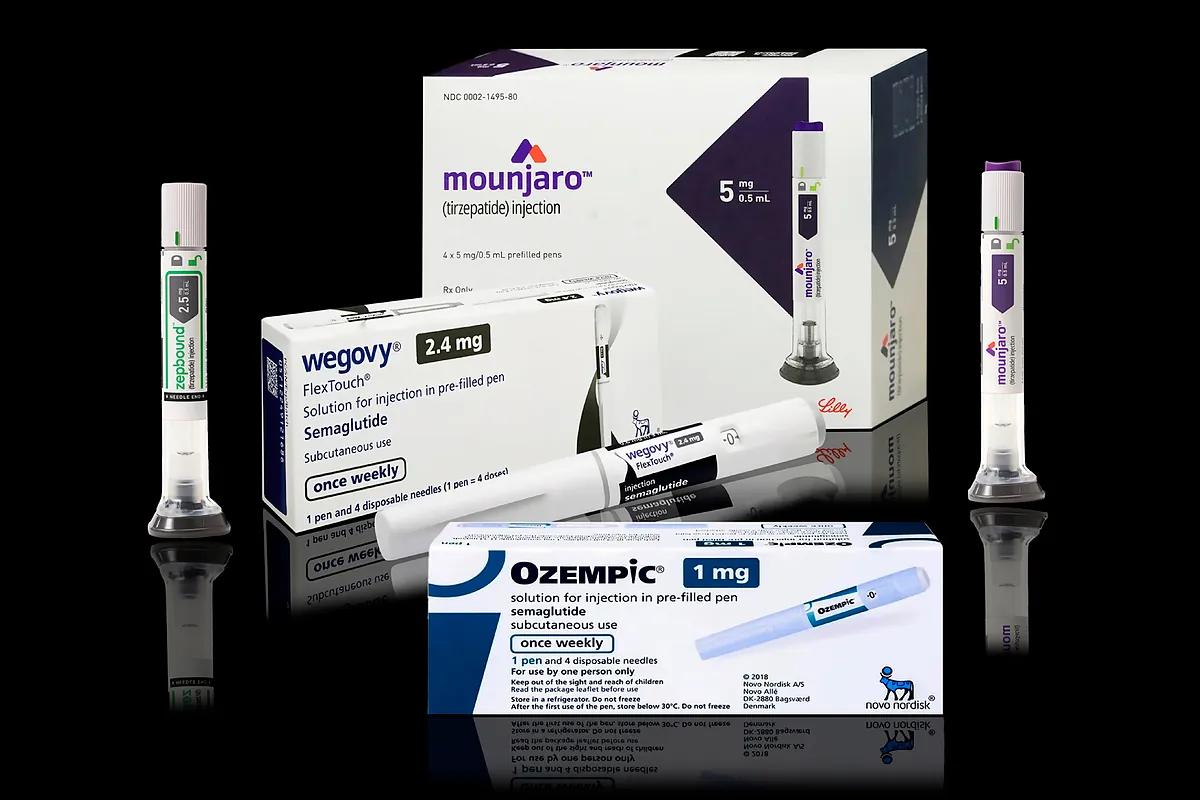Glucagon-like peptide 1 (GLP-1) receptor agonists, the hormone of hormone 2, diabetes, obesity and ...
According to a study, Semaglutide, the active ingredient in Ozempic, activates systems in the body that contribute to protective effects such as heart disease or stroke.Researchers should review the indications of these drugs in cardiovascular diseases beyond obesity and diabetes.
Glucagon-like peptide 1 (glp-1) receptor agonists, a class of drugs that mimic type 2 sugar protection, have the ability to protect weight or cardiovasculle strength.
These drugs, such as semaglutide, tirzepatide, and liraglutide, can help lower blood sugar and help with weight loss, making you feel fuller with less food.The best known of them, semaglutide (with commercial brands in Spanner Ozempic, Rebels, and Vegovi) was also shown in the SELECT trial, a clinical trial, to reduce cardiovascular (heart attack, stroke, heart attack) death in overweight or obese patients with heart disease, but without diabetes.
The selected study is one of the most relevant clinical trials in the study of obesity and cardiovascular relotting with treatments that reduce GLP-1 weight but also improve GLP-1 weight).The clinical trial of 17,604 participants found that obesity was reduced by an average of 8.51% and cardiovascular events were reduced by 20%.
The results also marked a revolution in the medical concept of obesity, which changed from being considered a risk factor to a chronic disease that directly affects the cardiovascular system, and weight management was introduced as a cardiovascular strategy even in people without diabetes.
Another important study was conducted on patients without diabetes in the STEP - HFEFFEFEFT trial.However, this relationship between obesity and cardiovascular events is tentative.
Despite these findings, the relationship between baseline lipid measures, semaglutide-induced weight loss patterns, and cardiovascular outcomes could not be explained.Now researchers from several universities around the world, coordinated by John Deanfield, from the Institute of Cardiovascular Sciences at University College London, have now carried out an analysis of the results of SELECT, suggesting that the active substance itself has a heart-protective mechanism.in addition to the effects of body fat loss, as they concluded.in work published in The Lancet, sponsored by Novo Nordisk.
To reach this conclusion, researchers conducted a definitive analysis of the SELECT trial to answer two questions: first, the relationship between baseline measures of fat (including total body mass and central fat distribution) and cardiovascular events;and second, the relationship between the rate and pattern of weight loss and subsequent cardiovascular benefits.
Specifically, they examined weight and waist circumference and the risk of subsequent cardiovascular events (cardiovascular death, non-fatal myocardial infarction, or non-fatal stroke) before and after semaglutide treatment in 17,604 patients aged 45 years or older with a BMI of 27 kg/m or more across 4,804 centers.(804 centers). Some of them were given semaglutide (2.4 mg) once a week, while others were given a placebo.The analysis found that semaglutide significantly reduced the frequency of these events compared to placebo, with benefits across all baseline categories of weight and waist circumference.
En el grupo de pacientes a los que se dio semaglutida, la incidencia de episodios cardiovasculares se redujo en un 4% por cada 5 kilogramos de peso corporal perdido y por cada 5 cent�metros menos de per�metro de cintura. En el grupo placebo, la menor circunferencia de cintura basal, pero no el peso corporal, se asoci� con un menor riesgo y la p�rdida de peso se asoci�, parad�jicamente, con un mayor riesgo. En aquellos que recibieron semaglutida no hubo una tendencia lineal que vinculara la p�rdida de peso con un riesgo menor, pero una menor circunferencia de cintura s� se asoci�, as� como la reducci�n de la circunferencia de cintura.
In summary, “the cardioprotective effect of semaglutide was independent of baseline adiposity and weight loss and had only a minor association with waist circumference, suggesting some mechanism of benefit beyond adiposity reduction,” they concluded.
Apart from diabetes
"Glucagon-like peptide-1 receptor agonists were originally developed for glycemic control in type 2 diabetes, and some have also shown efficacy in reducing weight and modifying cardiovascular risk in the non-diabetic population," they explain.
"La obesidad es un factor de riesgo bien establecido de morbilidad y mortalidad cardiovascular, que opera a trav�s de v�as hemodin�micas, metab�licas e inflamatorias. Sin embargo, el peso por s� solo no distingue entre la masa muscular grasa y magra, ni refleja las diferencias entre la grasa visceral y la subcut�nea, cada una de las cuales puede tener distintas implicaciones para el riesgo cardiovascular. La adiposidad visceral, en particular, se ha relacionado causalmente con resultados cardiovasculares adversos a trav�s de la liberaci�n de citocinas proinflamatorias. "Adem�s, los dep�sitos de grasa ect�pica, como la grasa epic�rdica y perivascular, podr�an ejercer efectos patog�nicos locales en el coraz�n y los vasos sangu�neos", apuntan.
The previous results of previous trials with Arglp-1 were conducted in patients with interpretation of cardiovascular benefits and other diseases related to diabetes.
On the contrary, "this study decides to choose a test that is selective, access to the blood karioevaculaular of the glp-1ra in the smoke of diabetes," the research."First we show that it is good for the card
"Our findings, combined with existing evidence, suggest additional cardiovascular and non-invasive treatments for glycemic control or weight loss."
"The independence of cardiovascular benefit from baseline adapazat and the magnitude of weight loss has important implications for clinical practice and health policy. Previous subjects as involved regardless of weight loss response, which urge the author for further mechanism to focus on research. Cardiovascular protection by GLP1ras."
This insight is critical as GLP-1RAs may be used primarily as weight loss agents and help refine weight loss drugs from disease modifying agents with broader therapeutic applications.








